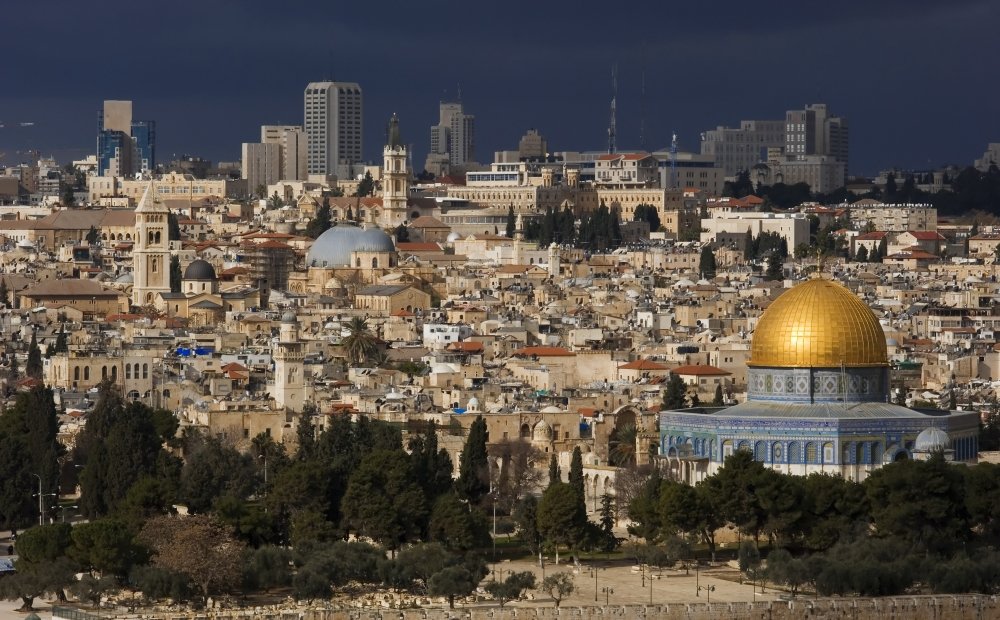Trump’s Jerusalem Decision: Implications and Consequences

President Trump’s decision to recognize Jerusalem as the capital of the State of Israel carries profound consequences for U.S. policy, relations with the Arab world, the international community, and the pursuit of Israeli-Palestinian peace.
In this conversation, three veteran observers and analysts of the Middle East and the Arab-Israeli arena interpret the change in U.S. policy and its consequences for the region.
Selected Quotes
Jane Harman
"I think there is a possibility that this is Phase 1 to get the Saudis to support the Palestinians, who will be in a far better position to agree to a state, which could be a smaller state, and to finally get to 'yes' on the ground. It's not the U.S. call - what the boundaries should be, but it is the call of those who live there, to get to 'yes' on two contiguous states. I could be wrong. If I'm wrong, sadly, we continue in this awful situation, but at least maybe I'm the optimist here and I just wanted to put that out there."
David Horovitz
“The first thing to stress is the degree to which the president’s declaration of Jerusalem as the capital of Israel has been applauded across the spectrum in Israel – and not all the way across the spectrum, but certainly from far to the right and well into the left.”
“The declaration makes it less likely that Mahmoud Abbas will come to the table and that certainly is a cause for disquiet… The Israeli attitude or assessment of where Abbas is… that I don’t think Israelis have been more down where Abbas is concerned then now, and I think it’s been an accumulating position.”
“In his speech, [President Trump] did not rule out Palestinian statehood. He made explicit that his declaration did not set the boundaries of Israeli sovereignty in Jerusalem and he called for no change of the status quo.”
Daniel Kurtzer
“One of the things that is most confounding to me is how easy it would have been for [President Trump] to translate this into a creative push in the peace process… The reality is that the United States has been trying to ride two different horses for much of the last 50 years, if not for the entire 70 years. One of those is to act as a third-party mediator and honest broker to the peace process… We have literally pushed aside others who have tried to gain a role… The second horse we’ve been trying to ride is to expand the relationship with Israel. Paradoxically, [this strategy works best] when there’s no peace process, because you don’t have to make choices. When you do have to make choices in the peace process, there are things the U.S. needs to ask of Israel that are hard to do.”
“What President Trump has effectively done here is that he is going to ride only one horse… and that is Bibi-sitting, rather than babysitting. He’s decided that it’s more important for the United States to expand, enhance, deepen, and strengthen its relationship with Israel than it is to enhance the very peace process that he has raised expectations about with regards to the United States’ role… Last Wednesday, [President Trump] basically sent the signal [that] if his ultimate deal is going to be made, it’s not going to emanate from American policy.”
H.E. Dr. Husam Zomlot
“The question here is what approach is President Trump’s administration taking towards peacemaking? I was on record to be one of the first to say that President Trump does present a historical opportunity, because and with me are many people in Palestine thought that he had respect on this issue very early on — and that was a very good sign. That he dedicated a special team for it — another good sign. He has also [in the beginning] picked the right approach that he’d like to pick a comprehensive, long-lasting deal… Wednesday comes and I don’t need to prove the point that he has injected anxiety, anger, and resentment.”
“In my opinion… the peace process is based on three major pillars; the first pillar is the framework… the second is the mediator… and the third pillar is the peace constituency… The announcement on Wednesday has severely damaged the three components of the peace process… We no longer have the standing U.S. policy of the two-state solution.”
“The most important alternative for us at this time is not to drop the two-state solution, but to look for more strategic ways to achieve it.”
Introduction

Moderator

Panelists
Hosted By

Middle East Program
The Wilson Center’s Middle East Program serves as a crucial resource for the policymaking community and beyond, providing analyses and research that helps inform US foreign policymaking, stimulates public debate, and expands knowledge about issues in the wider Middle East and North Africa (MENA) region. Read more
